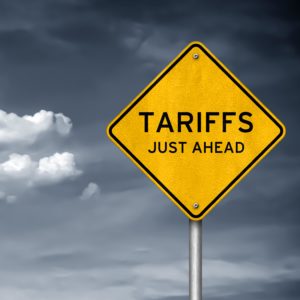 If you’ve been on the fence about making the transition to polymer resin vents or wall caps for your HVAC installations, now’s a good time to make the switch. Our UV-protected polymer resin products are built to withstand all sorts of weather and are impact resistant, even at low temperatures. This means that even after a hail storm, your customer’s wall caps and vents will look like new. And, plastic now has an unexpected benefit: it isn’t subject to tariffs.
If you’ve been on the fence about making the transition to polymer resin vents or wall caps for your HVAC installations, now’s a good time to make the switch. Our UV-protected polymer resin products are built to withstand all sorts of weather and are impact resistant, even at low temperatures. This means that even after a hail storm, your customer’s wall caps and vents will look like new. And, plastic now has an unexpected benefit: it isn’t subject to tariffs.
The new tariffs imposed by the U.S., a 10% tax on aluminum imports and a 25% tax on steel imports, came into effect on March 23, 2018. These tariffs will affect many industries, and ACHR News recently published an article, “Steel and Aluminum Tariffs Will Have an Immediate Impact on HVAC Industry,” which paints an unpleasant picture for the HVAC industry.
In the ACHR News piece, author Nick Kostora reports that there are more questions than answers and that many in the industry are worried. The main questions are how the tariffs will impact prices and the U.S. job market, and how other countries might counter the tariffs.
Most parties seem agreed there will be a negative impact on the price of goods made with steel and aluminum, but the extent of the impact is up for debate.
The director of industry and external relations at the Air Conditioning Contractors of America (ACCA) told ACHR News that, while the organization is unable to predict what the increase might be, contractors will certainly see an increase in equipment costs.
“That increase is likely to be passed on to consumers, and we’re concerned because, when consumers see higher prices, our members tell us that they’re usually driven to the lowest bidder,” he said. “And our members are always concerned about that.”
Hercules Industries, a significant steel product manufacturer, released a statement on March 20 announcing that due to market volatility, the company would be “implementing a 6% increase on all nonmaterial-intensive products and a 12% increase on material-intensive products.” The statement goes on to say that if Hercules is unable to source material domestically, further price increases will likely be necessary.
Because the North American Free Trade Agreement (NAFTA) is still being renegotiated, Canada and Mexico have been given a temporary exclusion from the tariffs. Exclusions or modifications of the tariffs for other counties could still be negotiated with the White House.
An online form is available for individual companies to apply for a product exclusion.
There is a great deal of concern about how the tariffs will impact jobs. Barton James, senior vice president of government relations at the ACCA, told ACHR news that there are estimates that 30,000 jobs could be lost. That number, he says, stems from the concern that, because the tariffs target raw materials, manufacturing overseas will increase, and the U.S. will see an increase in the import of finished products.
A case in point is Electrolux. The Swedish firm that manufactures appliances (including air conditioners) has halted plans for a $250 million plant upgrade in Tennessee. The company does buy steel domestically in the U.S. but is still concerned that the price increases will make U.S. manufacturing too expensive.
On a smaller scale, individual contractors may be looking at price increases for jobs that have already been quoted. Tom Craig, executive president of operations, Value Added Distributors, cautions contractors in all industries to be careful to factor in tariffs with any job commitments.
This advice holds true or Canadian HVAC contractors as well, because a great deal of the equipment they supply is manufactured in the U.S.. And it’s possible that manufacturers impacted by U.S. tariffs may increase prices globally.
Fortunately, factoring products from PrimexVents into job quotes will not be a new challenge. While we use some aluminum, we manufacture finished products and are not impacted by the tariffs. We are, however, watching developments closely, as should you.


